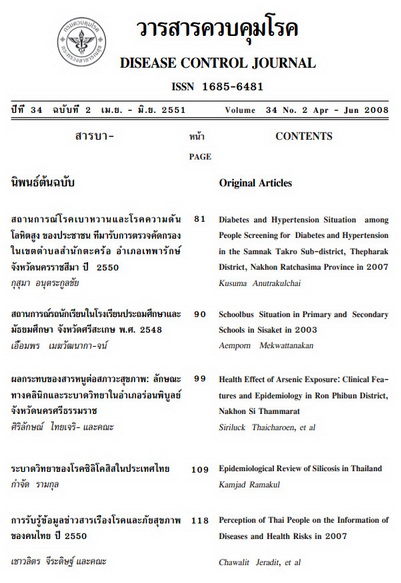Volunteer Factors Related to Discontinuation from the Phase III "Prime-Boost" HIV Vaccine Trial in Mueang District of Rayong Province
Keywords:
phase III, Volunteer discontinuationAbstract
The evaluation of candidate HIV vaccines in phase- trials required high retention rates for optimal evaluation of vaccine efficacy. Mueang district of Rayong Province, one of eight districts participating in the trial, had a high proportion of volunteers who had migrated to work in the province. This study aimed to identify factors related to volunteer discontinuation from the study. There were 3,480 volunteers screened in Mueang district between September 2003 and December 2005. Date of screening, daily number of screened volunteers in the district, birth place, and discontinuation from the study were analyzed. Screening days with more than 13 volunteers at all screening sites was defined as "over-screening". Discontinuation from study included withdrawal, lost to follow up for more than 1 year, or death.It was found that maximum number of monthly screened volunteers was 224 and the minimum was 29. Out of 3,480 HIV-uninfected volunteers, 2,304 (66.2%) were enrolled for vaccination. The discontinuation rate was 4.4% and the rate among volunteers screened on "over-screening" days was not different from the others. While the volunteers with other-province birth place had a higher rate of discontinuation than volunteers born in Rayong (5.8% and 3.0%, RR 1.92, 95%CI 1.28-2.86). No relationship between discontinuation and other demographic characteristics was observed. Therefore, more activities to support high follow-up rates among migratory volunteers were needed. For future studies, recruitment plans focusing on enrolling volunteers who were natives of the province, might help prevent study discontinuation.
Downloads
References
2. SW. Lagakos and AR. Gable (Editors), Committee on the Methodological Challenges in HIV Prevention Trials. Methodological Challenges in Biomedical HIV Prevention Trials. Available at http://www.nap.edu/catalog/12056.html
(access 1 March 2008)
3. Villacorta V, Kegeles S, Galea J, Konda KA, Cuba JP, Palacios CF, Coates TJ; NIMH Collaborative HIV/STD Prevention Trial Group. Innovative approaches to cohort retention in a community- based HIV/STI prevention trial for socially marginalized Peruvian young adults. Clin Trials. 2007; 4(1): 32-41.
4. Young AF, Powers JR, Bell SL. Attrition in longitudinal studies: who do you lose?. Aust N Z J Public Health. 2006; 30(4): 353-61.
5. Taylor-Piliae RE, Froelicher ES. Methods to optimize recruitment and retention to an exercise study in Chinese immigrants. Nurs Res. 2007; 56(2): 132-6.
6. Sapienza JN, Corbie-Smith G, Keim S, Fleischman AR. Community engagement in epidemiological research. Ambul Pediatr. 2007; 7(3): 247-52.
7. Golub ET, Purvis LA, Sapun M, Safaeian M, Beyrer C, Vlahov D, Strathdee SA. Changes in willingness to participate in HIV vaccine trials among HIV-negative injection drug users. AIDS Behav. 2005; 9(3): 301-9.
8. Kim YJ, Peragallo N, DeForge B. Predictors of participation in an HIV risk reduction intervention for socially deprived Latino women: a cross sectional cohort study. Int J Nurs Stud. 2006; 43(5): 527-34. Epub 2005 Sep 8.
9. Strycker LA, Duncan SC, Duncan TE, He H, Desai N. Retention of African-American and White youth in a longitudinal substance use study. J Ethn Subst Abuse. 2006; 5(3): 119-31.
10. Morin SF, Maiorana A, Koester KA, Sheon NM, Richards TA. Community consultation in HIV prevention research: a study of community advisory boards at 6 research sites. J Acquir Immune Defic Syndr. 2003; 33(4): 513-20.
11. Brown-Peterside P, Chiasson MA, Ren L, Koblin BA. Involving women in HIV vaccine efficacy trials: lessons learned from a vaccine preparedness study in New York City. J Urban Health. 2000;77(3): 425-37.
Downloads
Published
How to Cite
Issue
Section
License
Articles published in the Disease Control Journal are considered as academic work, research or analysis of the personal opinion of the authors, not the opinion of the Thailand Department of Disease Control or editorial team. The authors must be responsible for their articles.






